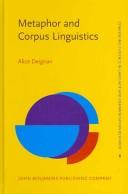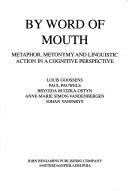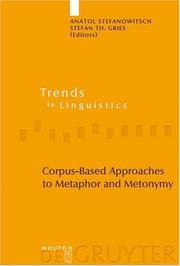| Listing 1 - 5 of 5 |
Sort by
|
Book
ISBN: 9783406688454 3406688454 9782821897106 2821897103 Year: 2016 Volume: 151 Publisher: München: Beck,
Abstract | Keywords | Export | Availability | Bookmark
 Loading...
Loading...Choose an application
- Reference Manager
- EndNote
- RefWorks (Direct export to RefWorks)
Verbs and nouns of meaning in ancient Greek and Latin are polysemous, just as in the case of the English verb “to mean". Andreas T. Zanker considers how the ancient vocabulary could be used in different ways and investigates its development over time. In the first part of the book, Zanker argues for the role of metaphorical and metonymical transference in the creation of expressions of meaning; Greek and Roman authors used the same verbs to describe what inanimate things, including words a...
Greek language --- Latin language --- Metaphor. --- Grec (Langue) --- Latin (Langue) --- Métaphore --- Metonyms --- Métonymie --- Parabole --- Figures of speech --- Reification --- Classical languages --- Italic languages and dialects --- Classical philology --- Latin philology --- Indo-European languages --- Greek philology --- Metonyms. --- E-books --- Métaphore --- Métonymie --- linguistics --- meaning --- Latin --- Greek

ISBN: 9789027238986 9027238987 9789027238924 9027238928 9781588116475 1588116476 9786612156755 1282156756 902729447X 9789027294470 Year: 2005 Volume: 6 Publisher: Amsterdam: Benjamins,
Abstract | Keywords | Export | Availability | Bookmark
 Loading...
Loading...Choose an application
- Reference Manager
- EndNote
- RefWorks (Direct export to RefWorks)
Metaphor is a topical issue across a number of disciplines, wherever researchers are concerned with how speakers and writers package and process messages. This book is addressed at readers from diverse academic backgrounds who are interested in ways of researching metaphor from different perspectives, and especially through corpus linguistics. A number of approaches to and exploitations of metaphor, including conceptual metaphor theory and cognitive approaches more generally, text and spoken discourse analysis, and CDA, are discussed, explored and critiqued using corpus data. The book also includes corpus linguistic studies of different aspects of metaphor, which investigate its linguistic and semantic properties and relate them to current theoretical views. The book demonstrates the need for naturally-occurring language data to be used in the development of metaphor theory, and shows the value of corpus data and techniques in this work.
Metaphor --- Metonyms --- Métaphore --- Métonymie --- Data processing --- Informatique --- #KVHA:Meertalige communicatie --- #KVHA:Metaforen --- #KVHA:Corpuslinguïstiek --- 800 --- 800 Taalwetenschap. Taalkunde. Linguistiek --- Taalwetenschap. Taalkunde. Linguistiek --- Lexicology. Semantics --- Artificial intelligence. Robotics. Simulation. Graphics --- Computerlinguïstiek. --- Corpus linguistics. --- Metaforen. --- Data processing. --- Métaphore --- Métonymie --- Parabole --- Figures of speech --- Reification --- LANGUAGE ARTS & DISCIPLINES --- Linguistics / General --- Philology & Linguistics --- Languages & Literatures --- Metaphor - Data processing --- Linguistics.
Book
ISBN: 9780271087368 0271087366 9780271087344 027108734X 9780271086057 027108605X Year: 2020 Publisher: University Park, Pennsylvania : The Pennsylvania State University Press,
Abstract | Keywords | Export | Availability | Bookmark
 Loading...
Loading...Choose an application
- Reference Manager
- EndNote
- RefWorks (Direct export to RefWorks)
How does the imagination work ? How can it lead to both reverie and scientific insight ? In this book, Kieran M. Murphy sheds new light on these perennial questions by showing how they have been closely tied to the history of electromagnetism.The discovery in 1820 of a mysterious relationship between electricity and magnetism led not only to technological inventions-such as the dynamo and telegraph, which ushered in the "electric age"-but also to a profound reconceptualization of nature and the role the imagination plays in it. From the literary experiments of Edgar Allan Poe, Honoré de Balzac, Villiers de l'Isle-Adam, and André Breton to the creative leaps of Michael Faraday and Albert Einstein, Murphy illuminates how electromagnetism legitimized imaginative modes of reasoning based on a more acute sense of interconnection and a renewed interest in how metonymic relations could reveal the order of things.Murphy organizes his study around real and imagined electromagnetic devices, ranging from Faraday's world-changing induction experiment to new types of chains and automata, in order to demonstrate how they provided a material foundation for rethinking the nature of difference and relation in physical and metaphysical explorations of the world, human relationships, language, and binaries such as life and death. This overlooked exchange between science and literature brings a fresh perspective to the critical debates that shaped the nineteenth century.Extensively researched and convincingly argued, this pathbreaking book addresses a significant lacuna in modern literary criticism and deepens our understanding of both the history of literature and the history of scientific thinking.
Electromagnetism in literature. --- Metonyms. --- Électromagnétisme --- Métonymie. --- Littérature et sciences. --- Literature and science. --- Dans la littérature. --- Poe, Edgar Allan, --- Balzac, Honoré de, --- Villiers de L'Isle-Adam, Auguste, --- Poe, Edgar Allan --- Balzac, Honoré de --- Villiers de L'Isle-Adam, Auguste de --- Criticism and interpretation. --- Critique et interprétation.

ISBN: 9027250456 9027282714 1283222086 9786613222084 9789027282712 9789027250452 1556193262 9781556193262 Year: 1995 Volume: new ser. 33 Publisher: Amsterdam : Benjamins,
Abstract | Keywords | Export | Availability | Bookmark
 Loading...
Loading...Choose an application
- Reference Manager
- EndNote
- RefWorks (Direct export to RefWorks)
This volume contains seven synchronic and diachronic empirical investigations into the expression and conceptualization of linguistic action in English, focusing on figurative extensions. The following issues are explored: Source domains, and their relation to the complexities of linguistic action as a target domain. The role of axiological parameter, the experiential grounding of metaphors expressing value judgements and the part played by image-schemata, how value judgements come about and their socio-cultural embedding. The graded character of metaphoricity and its corr
#KVHA:Linguistiek --- Cognitive grammar --- Metaphor --- Metonyms --- Pragmatics --- Values --- Axiology --- Worth --- Pragmalinguistics --- Metonymy --- Parabole --- Cognitive linguistics --- Cognitive grammar. --- Metaphor. --- Metonyms. --- Pragmatics. --- Values. --- Cognitieve spraakkunst --- Grammaire cognitive --- Grammar [Cognitive ] --- Linguistique cognitive --- Metafoor --- Metonymie --- Metonymieën --- Métaphore --- Métonymie --- Métonymies --- Pragmatiek --- Pragmatique --- Psycholinguistique cognitive --- Spraakkunst [Cognitieve ] --- Valeurs (Philosophie) --- Waarden (Filosofie) --- Psycholinguistics --- Grammar --- Aesthetics --- Knowledge, Theory of --- Metaphysics --- Psychology --- Ethics --- General semantics --- Language and languages --- Logic, Symbolic and mathematical --- Semantics (Philosophy) --- Figures of speech --- Reification --- Grammar, Comparative and general --- Philosophy --- Métaphore --- Métonymie

ISBN: 3110186047 9783110186048 9783110198270 9783110199895 3110199890 1282194941 9781282194946 9786612194948 6612194944 3110198274 Year: 2006 Volume: 171 Publisher: Berlin: Mouton de Gruyter,
Abstract | Keywords | Export | Availability | Bookmark
 Loading...
Loading...Choose an application
- Reference Manager
- EndNote
- RefWorks (Direct export to RefWorks)
The papers in this volume deal with the issue of how corpus data relate to the questions that cognitive linguists have typically investigated with respect to conceptual mappings. The authors in this volume investigate a wide range of issues - the coherence and function of particular metaphorical models, the interaction of form and meaning, the identification of source domains of metaphorical expressions, the relationship between metaphor and discourse, the priming of metaphors, and the historical development of metaphors. The studies deal with a variety of metaphorical and metonymic source and target domains, including the source domains SPACE, ANIMALS, BODY PARTS, ORGANIZATIONS and WAR, and the target domains VERBAL ACTIVITY, ECONOMY, EMOTIONS and POLITICS. In their studies, the authors present a variety of corpus-linguistic methods for the investigation of conceptual mappings, for example, corpora annotated for semantic categories, concordances of individual source-domain items and patterns, and concordances of target-domain items. In sum, the papers in this volume show how a wide range of corpus-linguistic methods can be used to investigate a variety of issues in cognitive linguistics; the combination of corpus methods with a cognitive-linguistic view of metaphor and metonymy yields new answers to old questions (and to new questions) about the relationship between language as a conceptual phenomenon and language as a textual phenomenon.
Information systems --- Lexicology. Semantics --- Mathematical linguistics --- Metaphor --- Metonyms --- Cognitive grammar --- Data processing --- Métaphore --- Métonymie --- Grammaire cognitive --- Data processing. --- Informatique --- #KVHA:Cognitieve linguistiek --- #KVHA:Metaforen --- #KVHA:Metoniemen --- #KVHA:Taalkunde --- 801.56 --- 801.56 Syntaxis. Semantiek --- Syntaxis. Semantiek --- Metonymy --- Figures of speech --- Parabole --- Reification --- Cognitive linguistics --- Grammar, Comparative and general --- Psycholinguistics --- Metaphor - Data processing --- Metonyms - Data processing --- Cognitive grammar - Data processing --- Cognitive linguistics. --- corpora. --- data analysis.
| Listing 1 - 5 of 5 |
Sort by
|

 Search
Search Feedback
Feedback About UniCat
About UniCat  Help
Help News
News